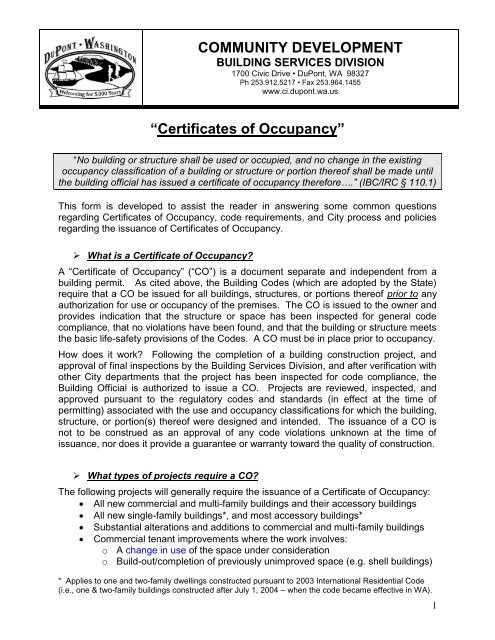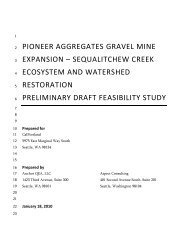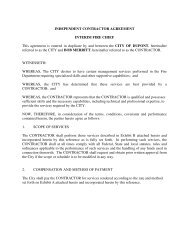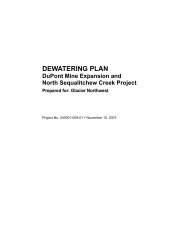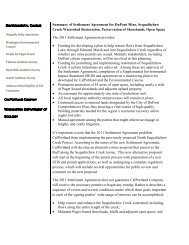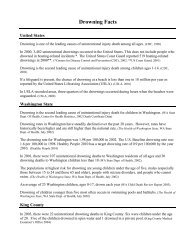Certificates of Occupancy - City of DuPont
Certificates of Occupancy - City of DuPont
Certificates of Occupancy - City of DuPont
Create successful ePaper yourself
Turn your PDF publications into a flip-book with our unique Google optimized e-Paper software.
COMMUNITY DEVELOPMENT<br />
BUILDING SERVICES DIVISION<br />
1700 Civic Drive • <strong>DuPont</strong>, WA 98327<br />
Ph 253.912.5217 • Fax 253.964.1455<br />
www.ci.dupont.wa.us<br />
“<strong>Certificates</strong> <strong>of</strong> <strong>Occupancy</strong>”<br />
“No building or structure shall be used or occupied, and no change in the existing<br />
occupancy classification <strong>of</strong> a building or structure or portion there<strong>of</strong> shall be made until<br />
the building <strong>of</strong>ficial has issued a certificate <strong>of</strong> occupancy therefore….” (IBC/IRC § 110.1)<br />
This form is developed to assist the reader in answering some common questions<br />
regarding <strong>Certificates</strong> <strong>of</strong> <strong>Occupancy</strong>, code requirements, and <strong>City</strong> process and policies<br />
regarding the issuance <strong>of</strong> <strong>Certificates</strong> <strong>of</strong> <strong>Occupancy</strong>.<br />
‣ What is a Certificate <strong>of</strong> <strong>Occupancy</strong>?<br />
A “Certificate <strong>of</strong> <strong>Occupancy</strong>” (“CO”) is a document separate and independent from a<br />
building permit. As cited above, the Building Codes (which are adopted by the State)<br />
require that a CO be issued for all buildings, structures, or portions there<strong>of</strong> prior to any<br />
authorization for use or occupancy <strong>of</strong> the premises. The CO is issued to the owner and<br />
provides indication that the structure or space has been inspected for general code<br />
compliance, that no violations have been found, and that the building or structure meets<br />
the basic life-safety provisions <strong>of</strong> the Codes. A CO must be in place prior to occupancy.<br />
How does it work? Following the completion <strong>of</strong> a building construction project, and<br />
approval <strong>of</strong> final inspections by the Building Services Division, and after verification with<br />
other <strong>City</strong> departments that the project has been inspected for code compliance, the<br />
Building Official is authorized to issue a CO. Projects are reviewed, inspected, and<br />
approved pursuant to the regulatory codes and standards (in effect at the time <strong>of</strong><br />
permitting) associated with the use and occupancy classifications for which the building,<br />
structure, or portion(s) there<strong>of</strong> were designed and intended. The issuance <strong>of</strong> a CO is<br />
not to be construed as an approval <strong>of</strong> any code violations unknown at the time <strong>of</strong><br />
issuance, nor does it provide a guarantee or warranty toward the quality <strong>of</strong> construction.<br />
‣ What types <strong>of</strong> projects require a CO?<br />
The following projects will generally require the issuance <strong>of</strong> a Certificate <strong>of</strong> <strong>Occupancy</strong>:<br />
All new commercial and multi-family buildings and their accessory buildings<br />
All new single-family buildings*, and most accessory buildings*<br />
Substantial alterations and additions to commercial and multi-family buildings<br />
Commercial tenant improvements where the work involves:<br />
o A change in use <strong>of</strong> the space under consideration<br />
o Build-out/completion <strong>of</strong> previously unimproved space (e.g. shell buildings)<br />
* Applies to one and two-family dwellings constructed pursuant to 2003 International Residential Code<br />
(i.e., one & two-family buildings constructed after July 1, 2004 – when the code became effective in WA).<br />
1
(“<strong>Certificates</strong> <strong>of</strong> <strong>Occupancy</strong>”, continued)<br />
‣ What is the process to obtain a Certificate <strong>of</strong> <strong>Occupancy</strong>?<br />
Generally, the Building Services Division will automatically process and issue a CO for a<br />
newly constructed one or two-family dwellings following approval <strong>of</strong> final inspection(s).<br />
These types <strong>of</strong> projects have typically received their project approvals from other <strong>City</strong><br />
departments during the permitting process, or during the construction process. For new<br />
commercial and multi-family projects, the approval process becomes somewhat more<br />
involved, as each project will have unique construction and infrastructure for its site and<br />
may additionally have specific conditions <strong>of</strong> approval. At the time <strong>of</strong> permitting for these<br />
types <strong>of</strong> projects, the Building Services Division will provide the owner (or authorized<br />
project representative) with a copy <strong>of</strong> the <strong>City</strong>’s “Project Close-out Requirements”<br />
checklist and other information to assist the developer and owner with preparing for the<br />
final approvals that are required to obtain the Certificate <strong>of</strong> <strong>Occupancy</strong> at the close <strong>of</strong><br />
construction. To assist with the CO approval process, the following steps are required<br />
for new commercial and multi-family projects:<br />
1. Early in the construction process, the owner (or authorized project<br />
representative) notifies <strong>City</strong> staff <strong>of</strong> the target date(s) for occupancy.<br />
2. 60-90 days before the occupancy target date, the owner must contact the<br />
Building Services Division to set up a preoccupancy meeting. This<br />
meeting will provide a discussion and review <strong>of</strong> the project closeout items<br />
required for the project and the approvals required for issuing a CO.<br />
3. 30 days before the occupancy target date, the owner calls the Building<br />
Services Division to start the internal CO paperwork and processing.<br />
4. The owner is then responsible for ensuring that the project work is<br />
complete and that all required inspections are scheduled with each <strong>of</strong> the<br />
appropriate departments and agencies involved in approval <strong>of</strong> the project<br />
work. (Delays in approval for occupancy are typically related directly to<br />
incomplete/substandard work, or failure to obtain required approvals.)<br />
5. <strong>City</strong> departments involved with the project must approve the work and<br />
provide sign-<strong>of</strong>f before the CO (or “TCO” – see below) can be issued.<br />
Approvals generally relate to completion <strong>of</strong> site work such as landscaping,<br />
utility infrastructure requirements, as-built drawings (including GIS), etc.<br />
6. After confirming required sign-<strong>of</strong>fs are complete, the Building Services<br />
Division will prepare the CO document. Staff will contact the appropriate<br />
project representative when the CO is ready for pickup at <strong>City</strong> Hall.<br />
‣ Does the <strong>City</strong> <strong>of</strong> <strong>DuPont</strong> issue “Temporary” <strong>Certificates</strong> <strong>of</strong> <strong>Occupancy</strong>?<br />
At the discretion <strong>of</strong> the Building Official, a Temporary Certificate <strong>of</strong> <strong>Occupancy</strong> (“TCO”)<br />
may be issued for a project (or portion there<strong>of</strong>), authorizing its use or occupancy prior to<br />
issuing a final Certificate <strong>of</strong> <strong>Occupancy</strong>. Issuance <strong>of</strong> a TCO will be considered only<br />
where (1) all life-safety requirements for the space under consideration have been met;<br />
(2) only incidental construction work remains on the project; (3) the owner agrees to<br />
meet all conditions <strong>of</strong> approval and complete all remaining work prior to the <strong>City</strong> issuing<br />
the final CO. Where authorized, a TCO is typically issued valid for up to 90 days. A<br />
request for TCO must be made in writing. The fee is $200.<br />
(Questions? Contact the Building Services Division for additional information.)<br />
2


